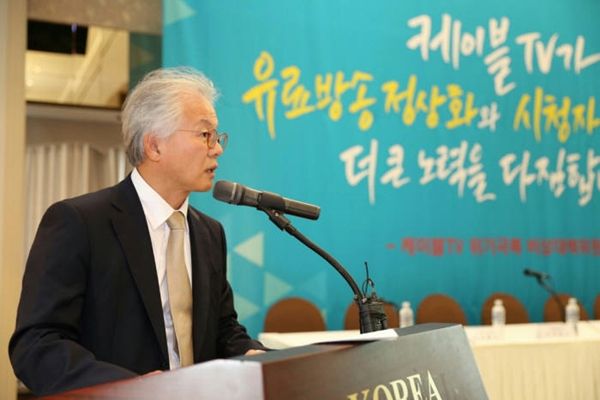Cable TV companies have made it official that they are pushing for fourth mobile network business.
They have decided to overcome structural limitations of cable TV businesses that do not have mobile network.
Industries are interested whether this will lead to actual mobile network business and it is predicted that this will also act as a variable for South Korean Government’s fourth mobile network policies.
“Although we have not decided on detailed methods yet, all of cable TV companies have agreed to push for fourth mobile network business.” said Secretary General Kim Jung-soo of Korea Cable TV Broadcasting Association at an Emergency Operation Committee meeting that was held by cable TV companies on the 5th.
This is the first time cable TV companies have agreed on fourth mobile network business and made it public to media. Cable TV companies are planning to satisfy convergence of media and trend of combined wire-wireless services through fourth mobile network and overcome structural limitations of cable TVs.
“By establishing our own independent mobile services, we are going to secure competitive edge in mobile services that can compete with IPTV companies.” said Chairman Choi Jong-sam of SO Council.
This decision made by cable TV companies was made from beliefs that it will be hard to gain competitive edge without mobile network products.
“Although cable TV companies are planning to overcome limitations from absence of mobile network through equal unification with MVNO (Mobile Virtual Network Operator), they believe that they will need fourth mobile network to solve primary problems.” said Chairman Tak Yong-seok of Emergency Operation Committee’s Advertisement Department.

On this day, committee introduce one-cable strategies such as enforcement of local-based services, completion of digital change, and development of next-generation systems.
One-cable strategy is a strategy that combines services so that SO (cable TV broadcasting stations), which is divided into 78 areas in South Korea, can overcome natural limitations to compete against IPTV companies that are nationally-based companies in sizeable competitions.
Its goal is to combine local channel brands and to complete digital change by 2018 when Pyeongchang Winter Olympics is held.
Cable TV companies are also going to push for development of ALL-IP-based systems. With a goal of increasing amount of transmission that is 8 times bigger than current network, they are going to provide services such as early vitalization of UHD broadcasting, media commerce, and N-Screen. They also announced that they will focus their investments towards Smart Home and Cloud services.
“We are planning to penalize companies that do not keep up with one-cable strategy.” said Chairman Choi Jong-sam of SO Council. “We are definitely going to implement this strategy to gain competitive edge.”
On this day, committee proposed an approval of ‘ground-wave broadcastings’ separate products (local choice)’ as a solution that can solve conflict regarding re-transmission fee between ground-wave broadcasting companies and cable TV companies. This is a measure that allows viewers to select channels that they want to watch through sales of ground-wave packages and charges them accordingly.
Beside this, committee made its anti-stance clear regarding discussion of widening of SO business right that is being discussed by South Korean Government as a solution that will strengthen SO’s competitive edge.
Committee argued that this solution by South Korean Government will only deepen competitions for low fees and can cause SOs to be kicked out from markets at a dirty cheap price. Above everything else, it argued that this solution denies values of SOs that are based on regionality more than anything else.
Staff Reporter Jeon, Jiyeon | now21@etnews.com